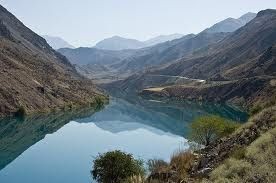BISHKEK (TCA) — On January 22, President of Kyrgyzstan Almazbek Atambayev signed laws on denunciation of agreements between the governments of Kyrgyzstan and Russia on construction and operation of Kambarata-1 hydropower plant (HPP) and the Upper Naryn HPPs cascade. The agreements were signed on September 20, 2012 in Bishkek during the visit of Russian President Vladimir Putin to Kyrgyzstan.
The denunciation laws were passed by the Kyrgyz Parliament on January 20.
Official view
Kyrgyzstan intends to attract investors for the construction of new generating capacity on the Naryn River, Kyrgyz Economy Minister Arzybek Kojoshev said at the Kyrgyz-Turkish Investment and Trade Forum held in Ankara on January 21-22.
According to the press service of the Kyrgyz parliament, in 2015 the Russian side did not solve the issue of financing the project due to financial problems and did not find sources of funding for 2016. This has led to delays of the HPPs construction. The Kyrgyz side has allocated 2458.5 hectares for the construction of the Upper Naryn cascade and thereby completed its obligations.
Russia has not given up the Kyrgyz hydropower projects but it offered new terms that do not meet the interests of Kyrgyzstan, Aibek Kaliyev, the newly appointed head of Kyrgyzstan’s National Energy Holding, said.
According to new terms, Kyrgyzstan shall buy electricity to be produced by the HPPs, although initially it was agreed that Kyrgyzstan will export it. Russia’s RusHydro offered new loan terms. Instead of a soft loan at 2.5%, the Russian side proposed a commercial loan at 8-10%. According to previous plans, 1 kWh of electricity should cost from 4.5 to 5 cents, bur under the new terms the electricity will cost from 9 to 10 cents, and it is too expensive for Kyrgyzstan, concluded Kaliyev.
Construction of four HPPs of the Naryn cascade has been postponed indefinitely and there is a need to find new investors. There are only economic reasons in this issue, no politics, he said.
According to the agreements, the Electric Stations JSC from Kyrgyzstan and RusHydro JSC from Russia were authorized to implement the project. Both companies own 50% stakes in the authorized capital of the Upper-Naryn HPPs Joint-Stock Company. Russia had to provide money for feasibility studies and 50% of the cost of the project with loans on preferential terms. Kyrgyzstan had to provide land for the project.
Upper-Naryn HPPs
It was planned to build the Naryn cascade within six years, and the first hydraulic unit of the main Naryn HPP-1 should have been put into operation in 2016. The Upper-Naryn cascade includes Ak Bulun, Naryn HPP-1, Naryn HPP-2, and Naryn HPP-3 power plants.
The total capacity of the cascade should be at least 191 MW, with average annual electricity production of 1.55 billion kilowatt-hours. The project was estimated at $425 million in 2012, and it was increased to $727 million at the end of 2013.
On June 12, 2013, Kyrgyz President Almazbek Atambayev and RusHydro Chairman Evgeny Dod took part in the ceremony to lay the first concrete in the future dam of the Naryn HPP-1. In October 2014, blasting operations began.
As part of the Upper-Naryn project, Russian money was spent to build a camp for construction workers, concrete plants, bridges, water supply, sewage and purification networks, access roads, transformer substations, etc.
On January 21, the Kyrgyz parliament established a commission to clarify the use of Russian $37 million invested in the Upper Naryn project.
Objective reasons
President Atambayev announced that Kyrgyzstan will look for new investors for Kambarata-1 and the Upper Naryn HPPs at a press conference on December 24, 2015.
“The Russian economy is not on the rise, and the agreements on construction of HPPs cannot be fulfilled by the Russian side due to objective reasons,” he said.
But there was also Kyrgyzstan’s fault, Atambayev added. The construction of Kambarata-1 had not started because Kyrgyzstan had delayed the issue of land acquisition. In addition, Kyrgyzstan had not taken advantage of the moment when Russia had money for the construction while the Russian economy was booming.
Conclusion
According to the agreements of 2012, they may be amended by written agreement of the parties. A written notice on termination of the agreement by one of the parties shall be sent to the other party, and the agreement shall be terminated upon the expiration of 6 months from the date of the notice.
Then Kyrgyzstan may look for a new investor.
According to Russian experts, Kyrgyzstan was just bargaining, and the threat of denunciation was one of the arguments. However, such step is not far-sighted, as compensation for the funds already invested by Russia would be a heavy burden on the Kyrgyz state budget in the absence of a new investor.
The problems with implementation of Russian hydropower projects in Kyrgyzstan are related to a significant rise in the cost of borrowing on the international financial market.
As a result, further implementation of these two projects based on the provisions set in the agreements is now impossible, Russian Foreign Ministry Spokesperson Maria Zakharova told journalists on January 21. The Russian side respects the partner’s decision to denounce the agreements and expects that Kyrgyzstan will respect the property interests of the parties at the exit of the agreements, she added.



